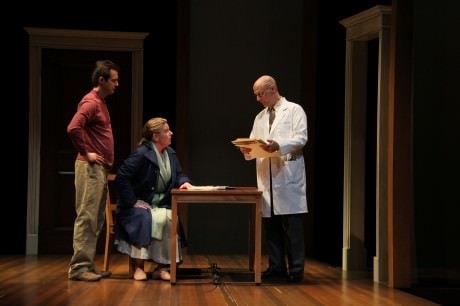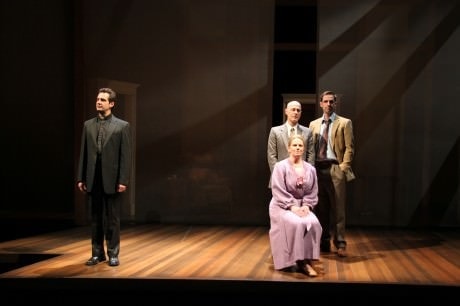As someone who considers himself more spiritual than religiously affiliated, I was weary about Bill Cain’s How to Write a New Book for the Bible at Round House Theatre. The tears and laughter that came over me at various points throughout this evening of deeply affecting theatre can attest to the fact that this play is for everyone, no matter what religion with which you are or are not affiliated.

Cain’s autobiographical play follows his family, consisting of his parents, Mary (Marybeth Wise) and Pete (Michell Hébert), and their two sons, Bill (Ray Ficca) and (Paul Danny Gavigan). In the midst of Act One, Bill addresses the audience with the following: “I’m going to say something about my family nobody ever says about theirs. I come from a functional family.” The anecdotes that follow illustrate just how functional these people are, such as a heated argument between Bill and Mary over butter that turns grocery shopping into a hilariously life or death issue. As the play unfolds, Bill compiles his family’s book for the bible, which one could equate to drafting a family history or family tree. We follow this family through good times as well as bad times, laughter as well as tears. In the course of the evening, the audience serves as confidants, voyeurs, and congregation to this capable cast of characters, assembled by Director Ryan Rilette.
Director Ryan Rilette, also Producing Artistic Director of Round House Theatre, has a lot to celebrate with this fantastic production. Rilette, while in his first season at Round House, is no newcomer to Cain’s work, having produced Equivocation and the world premiere of 9 Circles while at Marin Theatre Company. Rilette has assembled a dynamite team of actors to bring these characters to life in this play. The arcs of the comedic and dramatic moments are smooth, and the transitions between the flashbacks and the “present” moment are seamless. Each character is fully realized and plays a specific part in the well-oiled machine that is the Cain family.
Ray Ficca’s portrayal of Bill is a tour de force, as he narrates with an earnest quality that draws the audience in with each passing anecdote. The autobiographical nature of this play works because of the honesty with which Cain writes the portrayal of himself. We are constantly reminded just how human he is, as we laugh with his family members at his expense and shed a tear with him as he revisits emotionally trying times.
Marybeth Wise brings a keen physical specificity to her portrayal of Mary. Her muscle memory must be working overtime to remember the various statures she creates as time takes its toll on this woman throughout the course of the play, but the grace and ease with which she navigates this territory allows the audience to enjoy her performance as opposed to seeing the work behind it. She brings a lightness and innocence to her portrayal of dementia. Mary Cain is a member of a generation in which relinquishing control over one’s life is seen as defeat, a fate worse than death. She skillfully brings the reality of this situation to the surface.
Mitchell Hébert’s Pete, along with a number of other characters both male and female, is a delight to behold. There is nothing like watching a master at his craft. He exhibits a keen understanding of human behavior in various circumstances both light and heavy. My favorite moment of his is when he is sickly lounging in a chair as Bill reads to him, and utters, “I just want to look at you, Billy.” The juxtaposition of the beauty of the moment between father and son, and the brutal honesty in his subtext drew me even deeper into this story.
Danny Gavigan’s Paul serves as the perfect foil for Ficca’s Bill, and Gavigan brings a delightful nuance to the other minor roles he plays. The brothers are two very distinct people, receiving information and seeing the world differently. At one point Bill says, “Family is the crucible to turn passion into love.” Without skipping a beat, Paul shoots back, “Who talks like that?” Their relationship is indicative of siblings, it ebbs and flows at various rhythms over time. The vocal and physical transformation he went through before my eyes from civilian to soldier, and back again, is one of the most impressive stage moments I have ever seen. He grows from a boy into a man in the span of a scene, all while changing from “average Joe” attire into a soldier’s uniform in an at the same time ritualistic and poetic series of letters home to his family.
The technical elements of this production elevated the acting, directing, and playwriting, and created a world I wanted to explore for two hours. Rosemary Pardee’s costume design was overall muted, which lent nicely to the characters, with the exception of a couple moments that highlighted the drama of the situation, such as Bill’s pristine white priest’s vestments, Paul’s iconic army green uniform, and Mary’s rich violet dress. Colin K. Bills’ lighting design created moments of stark intimacy as well as overall home ambience. His amber highlight of Mary’s step outside her front door was arresting. Daniel Conway’s scenic design was angular, architectural, and interesting. Eric Shimelonis’ sound design was fluid and engaging, and provided a fine balance of mirroring both the scene preceding and following it.

In this new American family play, bookending bad news with jovial anecdotes and retellings, relationships both biblical and modern are explored at great length. The cyclical nature of life is brought to the forefront of our consciousness, as the parent becomes the child and vice versa. The roles of each individual are simultaneously explored and tested, in ways we have experienced or will one day experience, and in watching these events unfold I saw my own family, and hope that you will too.
How to Write a New Book for the Bible is not to be missed, as you will witness characters at odds with each other in familiar and new ways, and familial memories that will warm the cockles of your heart.
Running Time: Two hours 20 minutes, with a fifteen-minute intermission.
How to Write a New Book for the Bible plays through May 5, 2013 at Round House Theatre – 4545 East West Highway, in Bethesda, MD. For tickets, call the box office at by phone at (240) 644-1100, or in person at the box office, or purchase them online.





